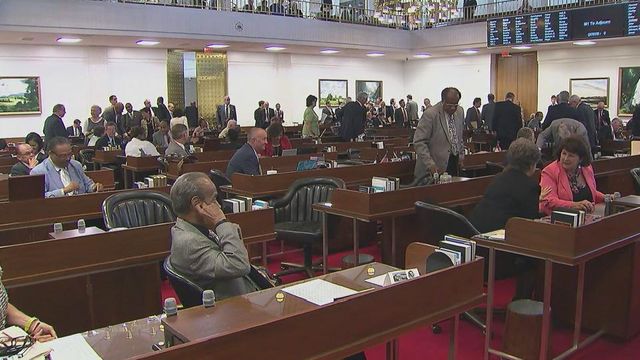Zoning limits headed to governor's desk
A proposal to limit local design and appearance rules for single-family homes is on its way to Gov. Pat McCrory after winning final approval in the state House on Tuesday.
Posted — UpdatedHouse sponsor Rep. Nelson Dollar, R-Wake, and other supporters argued that local requirements for certain types of siding, doors and windows, exterior decoration, roofing material, design and even color violate private property rights and can add many thousands of dollars to the price of a home.
"We do believe this bill is a balanced approach," Dollar said. "This bill helps homeowners be able to have the homes they want and it helps make those homes more affordable for working people."
Senate Bill 25 is similar to others that have passed both the House and the Senate in recent sessions. Rep. Rick Glazier, D-Cumberland, said it reflects the state Supreme Court's 2012 decision in Lanvale v. Cabarrus, which defined the "general zoning powers" of local governments.
"The color of my house doesn’t fit any of those," Glazier said. "Unless we’re willing to change what our view of zoning is, then too many cities and municipalities have gone too far."
The legislation would apply only to single- and two-family dwellings. Local governments would still be able to regulate the appearance and design of commercial buildings, apartments and manufactured homes. Rules for historic districts would stay in place, as would homeowners' association requirements.
Rep. Paul Luebke, D-Durham, said the state shouldn't interfere in local zoning decisions.
"Local governments have made decisions that they need these kind of regulations in order to make their cities better places to live," Luebke said. "If the the citizens of those local governments do not support these kinds of regulation, they can and they will vote out the council members and county commissioners who have put these laws on the books."
Rep. Frank Iler, R-Brunswick, said he opposed the bill because his constituents are worried it will take away the ability of coastal towns to limit the number of bedrooms in new houses to avoid an influx of huge "beach party houses."
Rep. Pat McElraft, R-Carteret, responded that that practice should end.
"When people own property, it’s their property," she argued. "They should not be telling that homeowner that owns that property how many bedrooms they can put on that house."
McElraft said she calls anti-development coastal residents "Got-Miners."
"They've got their homes, they’ve got their land, and when somebody comes in and does something a little bit bigger, a little bit different, they don’t like it," she said, adding that the bigger houses "pay for our education in our coastal counties."
Rep. Steve Ross, R-Alamance, argued that local governments should still be allowed to control infill development in existing neighborhoods. He expressed concern that the bill's removal of design restrictions would allow boarding houses to creep into neighborhoods.
Dollar said that a boarding house would be a commercial structure and, therefore, still subject to local regulation.
"There’s nothing in this bill that will suddenly lead neighborhoods to break out in a rash of boarding facilities," he said.
The bill passed the House 98-17. McCrory has 10 days to decide whether to sign it, veto it or allow it to become law without his signature.
After the vote, the North Carolina League of Municipalities, which opposed the bill in its current form, warned that it could make it more difficult for developers to drum up neighborhood support for infill projects.
"The result of today’s vote will be fewer protections from incompatible development for existing homeowners and the most important investment that most of them will ever make," said spokesman Scott Mooneyham in a statement.
Related Topics
• Credits
Copyright 2024 by Capitol Broadcasting Company. All rights reserved. This material may not be published, broadcast, rewritten or redistributed.






